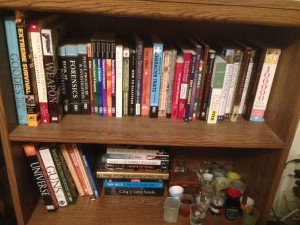A year has passed since I wrote my post on how we spend our time being a value statement, but I still find that my time is my most precious resource. By the necessity of my choices, I have become very skilled a juggling large workloads. Between extraordinarily long professional workweeks, maintaining my personal relationships, and the every day effluvia of keeping food on my table and a roof over my head, I somehow find the time to regularly blog and write fiction. It is a juggling act that I suspect that many aspiring writers will empathize with.
However, some of those balls, those commitments, have come disturbingly close to hitting the ground recently. I was able to recover, but as I grow older, the number and weight of my obligations grows ever larger. I fear that one day I will accidentally and irrecoverably sacrifice something important to me to feed my ambitions.
I have been pondering this possibility a great deal recently, as both my personal and professional lives gain momentum. For me, personal and professional progress is both exhilarating and terrifying. You see, once you start getting what you want, you have something to lose. As we chase accomplishment, we often put on blinders to what else is important in our lives. As an example, I was fortunate enough to be invited to dinner with an extremely successful author in her field at a convention I recently attended. During the meal, one of the diners asked the author what her greatest professional regret was. I can still remember the broken sound of her voice as she told our group that she was afraid that her daughter would never forgive her for the years she spent locked in her office.
Despite the trepidation that such examples inspire, I am unwilling to give up my writing and my dreams of professional authorship. After all, in biological terms, the fear response serves to both identify potential hazards and prepare us to face them. If I want to accomplish my personal and professional goals, I must use my fear, not be ruled by it. My unease reminds me that I have things that I value outside of my accomplishments, and in so doing, allows me to keep my other priorities in focus. I must choose what I sacrifice, not let circumstances decide for me. As an example, for the past couple of years, I have rarely played video games or watched television. By cutting out these activities, I have made more room in my schedule for writing. I have talked to many authors who have done the same thing. Compared to the rest of my life, that particular sacrifice was well worth the cost.
Throughout my life, I have found that accomplishment is almost always paired with sacrifice. It is up to me live deliberately and choose how I spend my time wisely so that I may both achieve my goals and retain what is important to me. To live is to risk pain. To fear is to be aware of that risk and to manage it appropriately.

